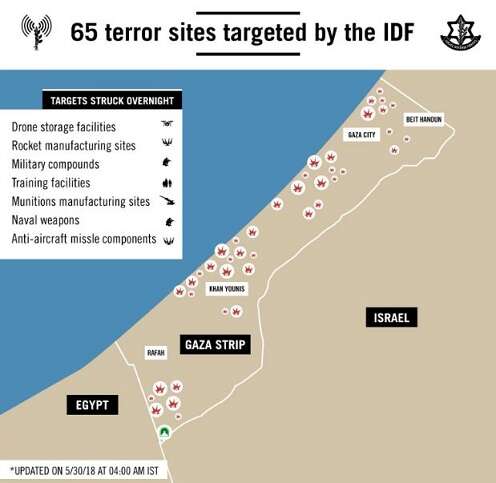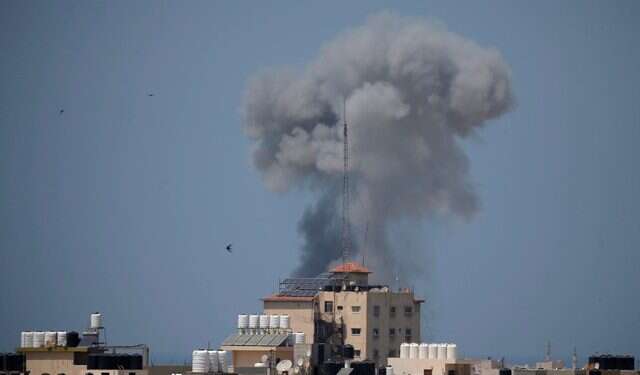Prime Minister Benjamin Netanyahu has convened the Diplomatic-Security Cabinet for a special session to be held Wednesday evening to discuss the escalation on the Israel-Gaza Strip border.
The Israeli military mounted several large-scale strikes on Hamas and Islamic Jihad targets in Gaza in retaliation for massive mortar fire from Gaza on southern Israel.
The barrage began shortly before 7 a.m. Tuesday and continued almost nonstop until the evening. It resumed overnight, with salvos targeting the Eshkol and Shaar Hanegev regional councils at 1:30 a.m. and again at 5 a.m. Wednesday.
The IDF said more than 130 projectiles were fired at Israel. Dozens hit on the Gaza side of the border, and most of those that breached Israeli airspace were intercepted by the Iron Dome defense system. A small number of mortar shells landed mostly in open areas in the communities near the border. One civilian and three soldiers sustained injuries.
It was the largest offensive from Gaza against Israeli border communities since Operation Protective Edge in 2014.
The Israeli airstrikes in Gaza Tuesday targeted more than 65 Hamas and terrorist hubs, including six military compounds, munition warehouses, naval targets, terrorist headquarters, and a Hamas tunnel that breached deep into Israeli territory from the Kerem Shalom crossing – the only goods crossing connecting Gaza with Israel.
"Hamas is responsible for everything the transpires in the Gaza Strip, including these severe attacks against Israeli citizens," the IDF Spokesperson's Unit said in a statement.
"Hamas has again chosen to act against the interests of Gaza's residents. After the violent protests on the border have failed, Hamas has chosen to launch projectile fire against Israeli civilians. The IDF views Hamas' terrorist activity severely and will continue to counter it with determination and force. The IDF is prepared to carry out its missions as needed and using a wide range of measures."

Palestinian Authority President Mahmoud Abbas condemned the Israeli strikes in Gaza, saying, "Israeli aggression against the Palestinians proves Israel doesn't want peace. The Palestinian Authority does desire peace and we pursue it."
Defense officials believe that neither Hamas nor Islamic Jihad were behind the mortar fire at Israel early on Wednesday, saying this was most likely the work of smaller, rogue terrorist factions in Gaza.
IDF sources said the Israeli airstrikes have dealt a crippling blow to Hamas and Islamic Jihad infrastructure and that Hamas has redeployed its security forces along the Gaza border to prevent further fire at Israel.
"The IDF has dealt them [Gaza terrorist groups] a significant blow," one officer said. "Israel has been acting forcefully and resolutely in recent months to thwart any attempt to violate its sovereignty or harm the security of the residents of the south. We will continue to counter any attempt to violate the peace with force. … The situation on the ground will dictate what comes next."
Hamas officials said Wednesday that the Palestinian militant groups in the coastal enclave have agreed to a cease-fire as long as Israel also halts its strikes.
"After the resistance succeeded in confronting the [Israeli] aggression, there was a lot of mediation in the past hours," top Hamas official Khalil al-Hayya said, in an apparent reference to Egyptian efforts to broker an end to the fighting.
"An agreement was reached to return to the [2014] cease-fire understandings in the Gaza Strip. The resistance factions will abide by it as long as the occupation does the same," he said.
An Islamic Jihad official said the cease-fire went into effect at 4 a.m.
Israeli officials said a message was relayed to Hamas saying that "if projectile fire is renewed, the strikes on Hamas and its satellites will be even stronger."
Despite Palestinian reports, neither Israeli defense officials nor political figures confirmed that a cease-fire has been reached.
Intelligence Minister Yisrael Katz sidestepped questions on the issue Wednesday, saying only that Israel is not interested in an escalation towards war.
"It all depends on Hamas. If it continues [to fire at Israel], I don't know what its fate will be," Katz told Israel Radio.
Habayit Hayehudi leader Education Minister Naftali Bennett said, "There are no understanding about it [a cease-fire]. Israel counters Gaza's actions and they will be the ones to determine their fate. We follow what's best for Israel's interests."
Bennett said Hamas' actions were clearly directed by Iran.
"The brain is Iranian, and the hands belong to Hamas. Israel is waging a focused and consistent campaign against the head of the octopus, which is Iran. Its tentacles reach Lebanon, Gaza and Syria in order to harm Israel," he said.
"While we strike Hamas in Gaza we can't afford to drop the ball and take our eyes of the target, which is Iran. Once we deal with the head of the octopus, we will fare better opposite its tentacles."
Bennett said Israel's efforts to counter Iran "are multidimensional: economic as we see with the U.S., diplomatic as we see with Russia, and there is also a military dimension. The days when we were willing to bury out heads in the sand versus threats are gone. We have gone from a policy of ignoring it [the threat] to a policy of determination."




